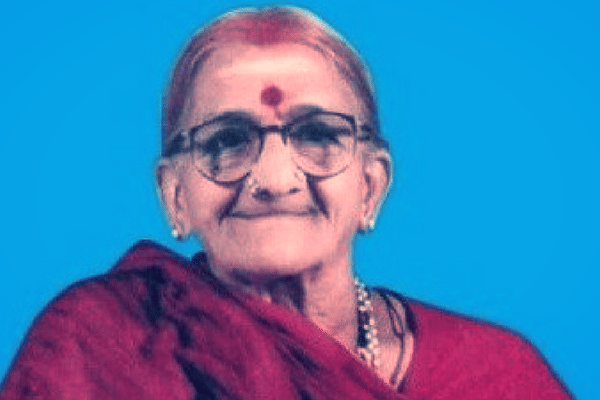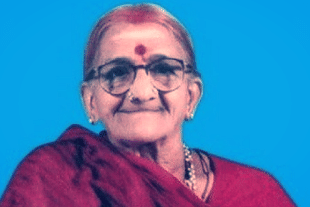Culture
Jamba – An Ode To A Great Life
Sriram Balasubramanian
Jun 30, 2018, 05:55 PM | Updated 05:54 PM IST
Save & read from anywhere!
Bookmark stories for easy access on any device or the Swarajya app.


There are few certainties in life that are more affirmative and decisive as death is. The end point for every human being is a certainty beyond the control of human mortality. While I had been preparing myself for this moment, the impact was unimaginable when it actually happened.
I heard about my grandmother, Mrs Jambalakshmi Ramamoorthy’s (JAMBA paati), passing at 90+ as I was driving in Washington DC on a humid weekend. She was a father, mother, guide, philosopher among other things. Not only was she the most graceful woman I have ever met in this lifetime, she was someone who was well liked by all concerned. Everything that I am today – my persona, my books (my first fiction book titled JAMBA: The Joint Family had her as the lead character) and even my ability to write this column (she was a cartoonist/satirist for well-known tamil magazines) – is because of her. I had to be in Chennai within the next 23 hours to attend the final rites. With this hope, I boarded an Air India flight to Delhi with a follow-up flight to Chennai later in the day.
The 14-hour journey to Delhi was perhaps the most excruciating journey till date. On the one hand, my mental frame was completely numb on hearing the news and coming to terms with it. On the other, the gamut of emotions/thoughts were pouring out unrepentantly at the physical level. The only way I felt I could address this was to look back and learn from her great life. Born in 1929 in Mannargudi (Dasaratha kootam) into a Tamil Brahmin family during World War I, she has witnessed so many generations (her own generation, her children, grandchildren and even great grandchildren) evolve in their own respective ways. She was accommodative in nature to all points of view, yet was firm in retaining her own traditional (madisar) identity till her death – she wore the madisar for large parts of her 90-year-life with such grace and saw it as a matter of immense cultural pride. Besides this, she was one of those rare people who touched every individual life in her own unique way. Be it the watchman in my flat in Chennai or the pookarama (the person who brings flowers) or the plumber who came to my house or even the President of Singapore whom she met impromptu when she went there – she made sure everyone felt special after meeting her. On occasions such as her birthday, she used to make sure all of these people, beyond the ambit of the family, were provided with some gift or the other. The fact that every individual who has met/interacted with her has a story to tell, resonated through my mind. With a bucket load of tears, to the amusement of my fellow passengers, I got off Delhi airport at 11 am on Monday awaiting to leave to Chennai.
As I walked past the transit gate at Air India, I was told by an AI official that the flight to Chennai was cancelled and that the next one would be at 5pm later in the day. This would mean that I would miss the final rites which was scheduled later in the day. With a deep sense of frustration and helplessness, I looked inward to ask the Lord what can be done. My deep sense of faith was nurtured and moulded by the sheer devotion that my grandmother had. She was a pious person all through her life despite years of poverty – a staunch devotee of Kanchi Paramacharya. Everything that she did would revolve around the deep-rooted Dharmic traditions of this land. In fact, all her life she used to write ‘Sriramajayam’ thousands of times and earn gold coins from the Kanchi Mutt for every 1008 of those. To her and to many other women from her generation, Dharmic duties and identities were not an afterthought, they were an integral part of life.
I swiftly got out of the airport and rushed to the domestic terminal to look for tickets. As I was praying, my cousin called and told me there was a Jet Airways flight at 2pm which would land in Chennai at 5pm. Even though this didn’t assure anything, I said ‘yes’ and boarded the flight. The crematorium authorities had told my family earlier that they couldn’t extend beyond 5.30pm for the final rites, so still me going there was a question.
The next 2.5 hours in the flight to Chennai was again deriving strength from my grandmother’s life. Her bravery and immense desire to embrace life was unquestionable. During the Chennai floods a few years ago, she somehow had the guile to navigate herself to safety despite water till knee level despite being in her late eighties then. Despite being in abject poverty in early stages of her life (till the 1970s), she raised her children successfully as value-based men. Whenever I used to ask her where she derives such grit and power, she would respond ‘Intha Pancha Boodangal Ennai Kappathum’ (these five elements of nature will protect me). I was hoping that the pancha-boodangal would save me.
The flight landed in Chennai at 4.30pm and I was picked up at the airport by my cousin. With a teary eye, I asked him if the final rites were done. He surprised me by saying that we were following my grandmother ahead. They had shifted the crematorium to one at Chrompet (near the airport) so that I could be part of the gathering (coincidentally, this was near her first house since moving from Mannargudi to Chennai in the 1970s). Within minutes, we were at the smasanam (graveyard) and the floodgates of emotions opened. I was endlessly weeping and struggling to maintain equanimity to come to terms with the loss of the closest family member that I have known. As I was doing my duties with a nei pandam for my grandmother (final rite obligations for the grandson) and put her to divine bliss, I couldn’t put to rest my unending emotional outcry in this regard. An era had ended – very few souls, according to Hindu faith, have had the grace of leaving this world on Ekadasi (Ekadasi maranam, triyodashi pradosham gaganam) – yet my timid human self was trying to reconcile everything.
On contemplative reference, this miraculous ability for me to reach Chennai within 23 hours of a tragedy was nothing short of divine intervention. The next 13 days of rituals post the death was a testimony to the importance of death in the pantheon of Hindu faith as a whole. If one has to understand or ingrain Hinduism, understanding death is paramount. The entire journey, with its metamorphic transformation from fear to faith, was a test of faith and a continuous reflection of my grandmother’s traits that powered me despite the obstacles around. In a society where values and relationships are commoditised, she represented a unique mix of tradition, pragmatism and an open heart to do good to whomever she met. Women who belonged to her generation protected and nurtured the Dharmic traditions with such elan and in a selfless manner. Though her physical presence is beyond me, her emotional presence will be with me till my lifetime in the decades ahead – JAMBA within me stays on forever.
Also Read: Book Review: Jamba – The Joint Family
Sriram Balasubramanian is a writer, journalist and economist. He tweets at @Sriram316.





